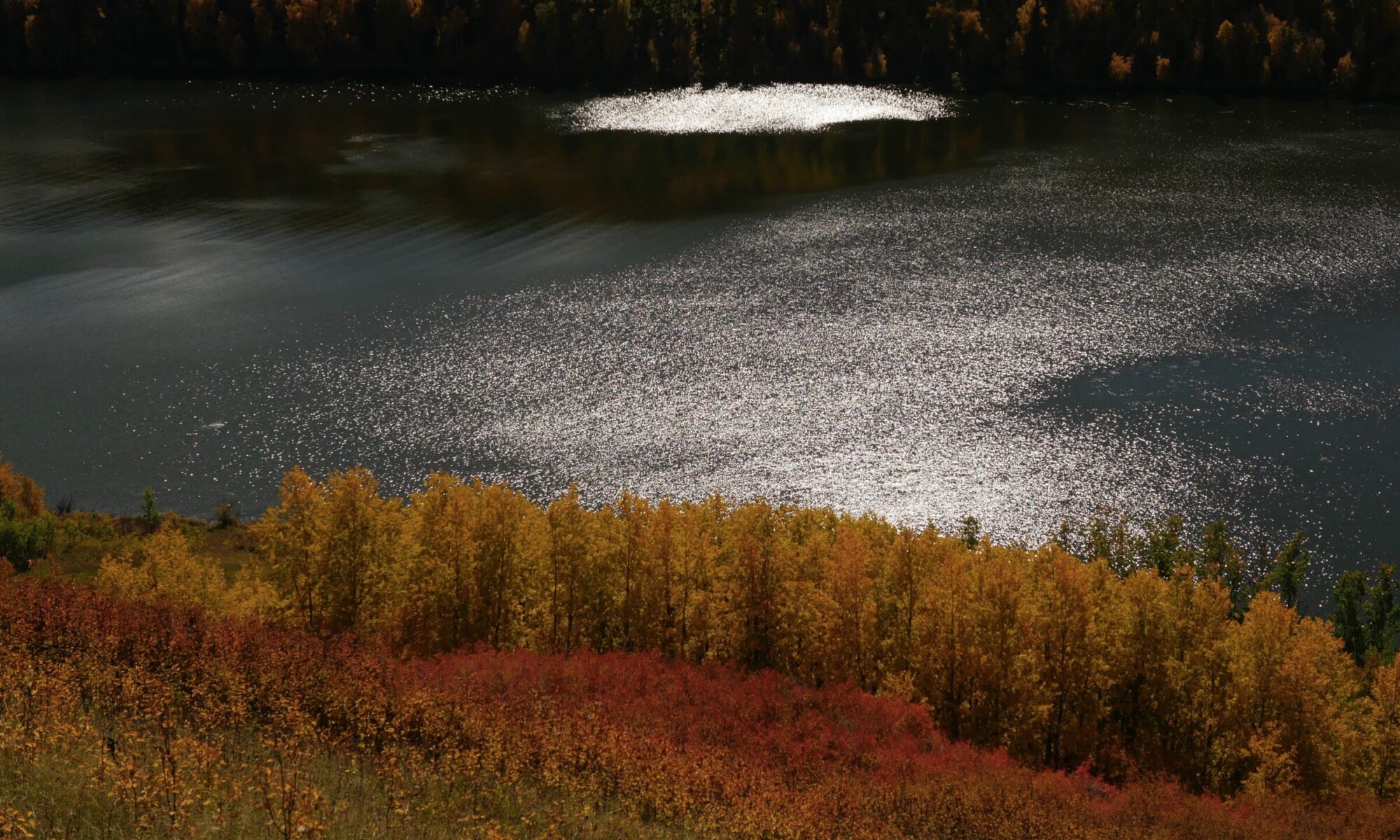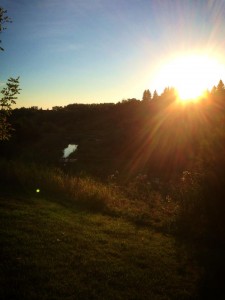Ubiquitously we are surrounded by risks in life; we are constantly being pressured, challenged and pushed. Being under these constant pretenses causes a universal feeling of stress. The prescription that has followed to mitigate these stresses are usually in the forms of medicine, types of a condensed elements that help numb the tension and strain that we knowingly apply onto our mental and physical bodies. In this week’s readings, I agree that we are in need of some Vitamin N in our lives if we are expected to heal both physically and mentally. A quote that started my progression into putting myself with and in nature is,
“Humans living in landscapes that lack trees or other natural features undergo patterns of social, psychological, and physical breakdown that strikingly similar to those observed in animals that have been deprived of their natural habitat.”
Remembering that I am nothing more than another animal is humbling to my sense of being. We as a species may be highly “developed” in sense of social structures, scientific knowledge, having the use of five appendages, learning and retaining “intelligence” but simple reminders that I am just another animal here to “eat, sleep, procreate” are very comforting. I often find myself becoming so absorbed in the tasks for the day: drop this at so and so’s desk, fill in time-sheet, write reflection, meet with Kate to help her do that drama thing, pay phone bill, don’t forget to eat, make list for the list of things to do, that I forget that I am just another animal. And yes, I understand that with our complexities in society there are certain things expected of me to complete and withhold but sometimes it is nice to just stand back and realize that in all the essence of craziness, we are just animals.
In exploring nature, I think it is important to bring ourselves down from a hierarchical state and let ourselves be seen in within nature, never above it only then can we benefit from holistic healing. In Patricia Hasbach’s ecotherapy she testing what she calls “mapping the internal landscape”. When I first read this, I began thinking, what would the landscape of my mind look like if I was to walk through it now? Trying to envision what this may look like, I try to walk through my mind. What I see is a black room full of a stack of lists upon lists of things to accomplish. Near at my feet are things I must accomplish soon and at the back there are my future goals. In the middle stand the people that are important to me, I see them kicking their feet, some with flashing signs saying you missed their birthdays, and another is saying you should call me soon. I know this image all so well. In fact, I am in my internal map a fair bit.
Walking to school, I walk on a gravel road, where I pass a small hidden park, sometimes my neighbors have a fire going, I can smell the strong smoke that touches my body, I see the recently fallen leaves, but above all I see these things through calculated eyes. I see the tangible and the explainable. I read my surroundings not with my spirit and soul only my mind. In fact, I usually can see and notice changes in my environment, such as I have noticed that every week the Mündel’s part of the alley is drenched in a substance, which I have explained to myself as some sort of watering system. I can make these types of analyses all while consulting my task list in my head. I think this week’s readings eludes the stark issue in that in healing from your environment, from nature, is that you have to truly immerse yourself in it. I comprehend that the readings are a factual representation of trials and studies that concur that nature can heal a person but more importantly, at least for myself, I want to learn not that it works but how to do so in a way that both nature and I are mutually benefited. Outdoor exercise or green exercises for example, in my opinion, are petty examples of how to heal through nature. First of all, when I think of “exercise” or working out at all, in any manner, I automatically am reminded of pain or a time where I am forcing myself through something I thought I had to do because my body needed. In this sense, it just becomes another one of my daunting tasks. Therefore, why must we call it exercise? Why can we not just say, “oh… I’m going to go experience nature” or “oh, I’m going to go look for my peak experience in nature” or “oh… I’m going to have my Pocahontas moment with nature”. Using the word, ‘exercise’ to me diminishes the full meaning of what can be gathered in and through nature. To me it is similar to the concept of ‘putting the headphones on and in’ while being in nature. The semantics of connecting with nature then should mimic the peak experience that you can derive from it. So please help me, other than my poor explanation of engaging with your inner Pocahontas, tell me what you call connecting with nature? What do you call the action of healing with and from nature?
Intimacy With Nature
I am not much of a poetry writer but after reading the Indigenous Mind by Kaylynn Sullivan Twotrees I was inspired to write a poem. The title of my poem is derived from a sentence that really called to my own spiritual struggles.In the sentence she writes, “Accessing [the power of consciousness means] a commitment to slowing down, remembering, and re-conceiving on a smaller scale to reclaim intimacy with nature and its layers of species as an aspect of my own essential nature”. I too often fall captive to the constant busyness of life that I forget to take these moments. Most times it gets to the point where I find myself yearning for nature to take me back. And this poem is my articulation of this struggle:
With her I take the last breath
Sorrowfully learning the meaning of connection
Feeling more alive than ever, I thank you death
You are my portal to a deeper reflection
The rhetoric of life causing repentance
A moment paused for redirection
Contemplation of the interdependence
Complexities in need of the finest dissection
Only in a heavenly melody
Do I find myself to have meaningful collection
The beat, the voice, slows me down mentally
The soul open to perfection
Yet hopelessly drowning in damage control
The spiritual realm is in rejection
To the consumer soul
Struggling to get up, for protection
Mother Nature takes my hand
Looks me in my eyes with inspection
Opens the winds, the light, and shows me the land
I place myself here, forced injection
You are my portal to a deeper reflection
Struggling to get up, for protection
Ya, I’m a farm … No actually, I just grew up on a farm
In reading Wendell Berry, I feel an immense urge to get in my truck, drive home to the farm I grew up on and hop on a tractor to help my Father finish harvesting.
I grew up on a little farm, about 16 hundred acres, on a reserve up north.
The sad realization that I have come to in reading Wendell is that I do not know how to use the land well. I do not have or make the time to use it well and I most definitely cannot afford to use it well. Yet, when people ask me if I’m a farm girl, I gloat and happily say yes. It is true that I have grown up hearing my father talk about how frustrating it is that the flood has taken away more than half our crop yield, or that he’ll have to sell X many cows if he expects to feed every cow with enough food this winter. But that’s just it I have heard stories like that all of my life, it’s all he talks about yet I still do not know how he operates the farm. I do not know his crop rotation, I do not know where he has decided to plow, I do not know how he knows every cow and bull in the fence, I just do not know…
I am in the line to inherit this land, yet I know nothing of it.
I feel that when I say that, I am a farm girl, diminishes those who work so hard to know the nature around them, to know how to cultivate it, or in Wendell’s words, to know how to converse with nature.
Wendell talks about a law that states, ” Land that is in human use must be lovingly used; it requires intimate knowledge, attention, and care.”
At this point in my life, I can honestly say that I could not tend to the land to the extent that my Father does now and I don’t know if I will be able to. My motivation to go back to the farm is very low. For so long I have been told to get an education and do better for myself then to live back home. I could have never predicted that it would be my education, my critical thinking, and my profs would subtly be pushing me back to the farm. Unfortunately that’s how I see it. That I would be working backwards. Talking to people who are still so captivated and blinded by the capitalistic and consumer culture, I too become blinded by greed. Through this cultural perspective, going back home would be seen as failure. I know in my heart that working with the land would have an ineffable spiritual value. My senses would connect to nature. I could learn to converse with nature… To learn and use all of my senses. So why!!! Why am I still so attracted to a culture that degrades and prevents the maturity of my mind and soul!!
Poverty of the Senses
One of the biggest questions that, The Nature Principle drew my attention to the most was, what do we miss seeing, hearing, and knowing because we allow the tangle of technology’s wire to tighten around us a little more each day? What else can we do that we have forgotten?
I have heard time and time again that human’s only tap into a very small amount of our brain throughout our daily lives. Meaning that there is such a vast amount that we do not harness nor take advantage of but how do we harness these senses? Yesterday, I was on my way to lead a seminar for Aboriginal studies. I was feeling rushed as I made a smoothie for the class. I looked in the cupboard to choose a cup for the smoothie, as I reached for the canning jar that I was going to make my cup, a voice came in my mind, “don’t use that one”. Now … I must admit that I am the type of person that can have a hundred conversations in my head, argue with myself, and both win and lose these battles. But THIS voice, it was different. Nevertheless, I shrugged it off and decided it was the perfect cup.
I longboarded to school shortly after, which then I proceeded to fall off my longboard where the glass cup broke and slit my hand open. I was overwhelmed with emotion at the time, yet now that I look back, I can hear that voice clearly. This brings me to another part of the book, poverty of the senses. I see that voice now, as my intuition. For such a long time I have not heard it, or maybe it is that I have not listened to it. I think that if any sense, this is one that I want to learn to listen to it. To be able to discern it in my head but most of all, learn to listen to what it is trying to warn me about.
Like I said earlier, we humans only tap into such a small part of our brains. I do not know how intuition works but there are so many times in my life where it could have been useful if I just listened. The mind, the brain, the heart all give us signals and I need to learn to listen.
The present moment
Teaching myself, or trying to teach myself to be present is met with very little ease. As I am asked to be present, I contemplate what that means I must do. Is it that I must touch, smell, and take it in for all that it is in that moment? What if I use past memories, to bring meaning to the present? Does that mean, I’m cheating my present by remembering it through the past?
I walk, and decide that I am allowed to use the past to embrace the gifts of the present. I choose to use my camera as a portal so that I may catch and preserve my present.
I embrace and pay attention of what my surroundings bring to me, and wonder, maybe too much on what conclusions they bring me.
1st a picture of the Sunset. So simple to acknowledge yet something that I usually do not allow myself to embrace. Faced with the ideas and plans of the future or even the act of reminiscing the past are too often used as an escape from what is before me. As I walk in the shadows of light, I feel its heat and energy course through my body. I am only yet another spectator who is able to capture its many sides of beauty. I am privileged.
2nd Picture car in cemetery. Finally paying attention to the world around me, I am made aware of the amount of life taking place before me. I find myself unable to catch up to nature, watching birds fly by, dragonflies make love in mid-air (impressive), ants renovate a new mound, and in the midst of all this still managing to listen to the knowledge being spoken around me. I am almost repulsed but more so overwhelmed by the beauty and the perfectness of it all. I am not the type that can handle too much good in life, let alone natural beauty. I almost become sick with happiness but then in the distance, I see a person visiting a deceased loved one in the local cemetery and my heart is calmed by the idea of death. For how could I truly appreciate life in the present if there are no limits, if there were no end. My respects go out to the evening visitor; I too, have made that trip… too many times to count.
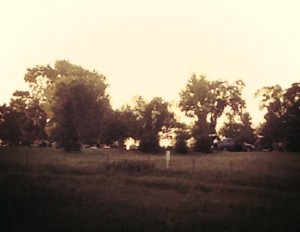
3rd picture. Bird. Much chatter is going, it is hard to say what others are actually taking in. Yet in mere camouflage, the eyes of a fellow walker catch what the heart wants to see… nature in its purest form. We watch as the bird takes in its supper time, oh the art of catching ones food… a lost art for most.
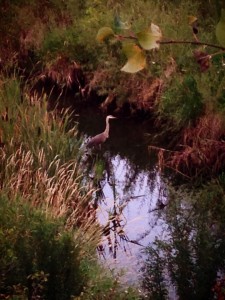
4th picture Beaver’s work. Left behind a few stumps, I seen an example of the pure raw strength that nature and its children have. My mind is perplexed on how to approach such forms of work. I am not educated much on beavers but I speculate that the beaver used pure instinct to gather supplies to build its home, not just a place to live but a home. Which I believe is safe to say that we all seek a home, physical or not. Yet on the other hand, the destruction and emptiness left behind by what I consider is living through natural instincts scares me to think of what destruction I have left in my own path. Note to self: become aware of the effects that my instincts have.
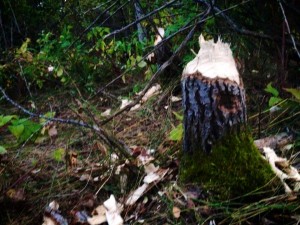
5th a video of a moth. I see the struggle of life. No need to know the story of how it got there or why it is there, all I see is a struggle that life has created. I stand above it, to bring attention to it on purpose to gauge people’s reactions. As I suspect, the moth itself is noticed, but the struggle it goes through is almost in a sense sugar-coated. No real worry for the moth is conjured, the beauty of it is acknowledged the most. Then surely, one by one each person leaves it. Yet I stand hovering above it. I see it struggle but more than that I can feel it. I can only imagine death is to come to it soon. I contemplate what would I want on my death-bed. Would I want people to come to see me as I struggle, to see me at my weakest point yet only compliment me on the beauty I give as they leave me alone to die or would I want someone to end my suffering for me. In the end, I kill it. I walk away questioning if that was really my choice to make… I am a beaver in this moment of instinct.
